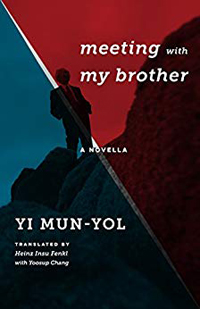 Yi Mun-Yol, translated by Heinz Insu Fenkl, with Yoosup Chang, Meeting with My Brother: A Novella (New York: Columbia University Press, 2017), 92pp.
Yi Mun-Yol, translated by Heinz Insu Fenkl, with Yoosup Chang, Meeting with My Brother: A Novella (New York: Columbia University Press, 2017), 92pp.
This autobiographical novella begins with the failed attempt of the main character and narrator, a South Korean professor named Yi, to meet his father for the first time in forty years. This meeting was both illegal and quite dangerous. Yi describes his father as having been a "naive revolutionary" who abandoned his wife and three children and defected to North Korea at the outbreak of the war. Among other things, this stigmatized them as the family of a traitor. When Yi learned that his father was still alive, he paid a Mr. Kim to arrange a meeting with him, but before they could meet, his father died. Perhaps out of shame or a sense of obligation, Mr. Kim then offered to connect Yi with his half-brother in North Korea, for his father had remarried and had five more children with his second wife.
As you would expect, Yi was horribly nervous to meet this half-brother for the first time. Their encounter begins with mutual suspicions, assumptions, misapprehensions, and questions surrounding their respective homes and histories — the reclusive and repressive north, and the westernized and consumerist south. Is Yi really a millionaire?! Doesn't his brother live in grinding poverty? They discuss historical naming conventions, and especially ancestral memorial rites for their deceased father. Reunification looms large. And so the many layers of the divided Korea emerge through the prism of this sibling rivalry that turns into a relationship: "half brothers, living in their respective half countries, who have inherited a situation that neither one wants and that weakens them both, and binds them by keeping them apart." (xviii).
The novelist Yi Mun-Yol was born in 1948, just two years before the start of the Korean War. He is South Korea's most celebrated writer of the last thirty years, having written some two dozen books that have won every literary award that country offers. "There is no other writer," says translator Heinz Fenkl, "whose work addresses such a broad spectrum of psychological, cultural, political, and historical themes." For more on North Korea in particular, see my reviews of the 2006 movie Inside North Korea; and the two books Nothing to Envy; Ordinary Lives in North Korea (2010) and Escape from Camp 14 (2012).


